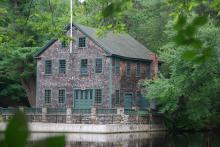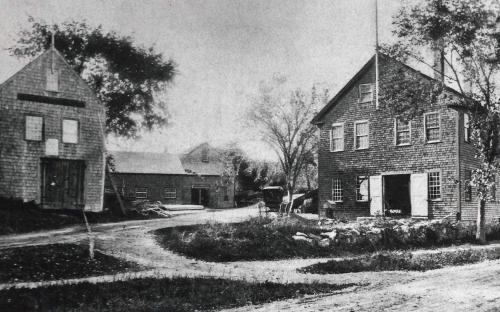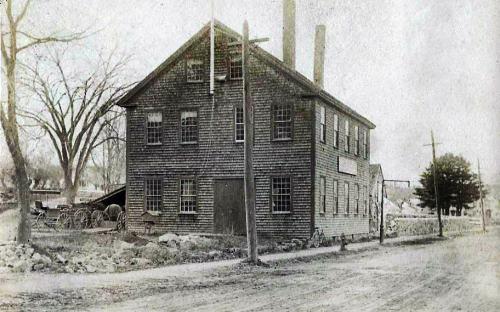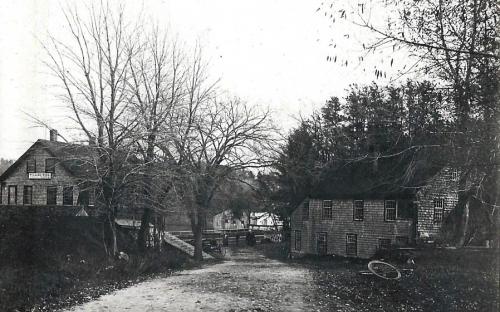Architectural Description:
one interior chimney, 2 stories, front gable end facade, front entrance, regular identical 12/12 windows, corner boards, wood shingle exterior.
Historical Narrative:
present owner Trustees of the Reservations
formerly - Mrs. Cornelius A. Wood II
Themes: Architecture, Industry and Community Development
Part of "Arden" - large private estate, extensive gardens
Although this is altered it is one of the few pre-Industrial revolution, industrial buildings left standing in Andover.
See form A
The building now known as the “Arden Casino” has a long historic history for the residents of Andover. It was once one of the premier wagon shops in the Merrimack Valley and a station for the Underground Railroad. William Poor was a wheelwright and carriage maker who built his Wagon Works on the raceway draining out of Poor’s Pond at the then corner of Poor and North Main Streets. William Poor was born in the North Parish of Andover on October 12, 1805 and died on December 30, 1898 living for 65 of those years in Frye Village in his home across the street from his business. William was the son of Joseph & Mary (Bradley) Poor and the fourth child of eleven. At age 21 William took up the trade of wheelwright becoming an apprentice with his maternal grandfather George Bradley of the North Parish in Andover. It was under Bradley’s skillful direction that William soon became an expert wagon maker. William first went to work in Methuen and was living there when he married on May 14, 1829 to Hannah Gleason White of Andover. William & Hannah would have four children; Martha, Julia, Joseph W. and Charles.
In 1833 William settled in Frye Village and opened his blacksmith shop at this location on North Main Street. The wagon shops were approximately where the First Christian Church Scientist is located toady. It is said that the “first steel-backed scythe was hand forged by this gentleman.” In 1838 William’s younger brother Jonathan Poor joined in the work as wheelwright. In 1846 William’s son Joseph W. joined his father’s business at age 16. The youngest son Charles H. also worked for many years as a general helper in the family business. By 1850 the business was well established and included a Wheelwright shop, Blacksmith shop, Lumber house, Carriage house, fixtures and land valued at $1400. In the Andover Advertiser, May 31, 1867 pg. 2 "William Poor purchased land of Mrs. Lucretia Richardson, adjoining his shop in Frye Village and is about to erect a building 32’ x 42’, two and a half stories, for the painting and blacksmithing branches of this carriage manufactory…."
This building is the only surviving structure of the Poor Wagon Works.
The wagon company was well patronized throughout New England and William was considered “the best wagon builder in the state.” His honestly, craftsmanship, and reputation for a quality product, especially butcher carts, brought many clients. “Among the most famous being a missionary’s cart which was sent to Turkey and scores of wagons specially designed and sent to Oregon in the pioneer days of that state, from 1856 to 1862.”
William Poor was an abolisonist as were his family and their homes and business have been linked to the Underground Railroad as safe stations for fleeing slaves headed north to Canada. The Poor family were members of the Free Christian Church in Andover.
On May 4, 1869 William’s wife Hannah died and the following year he remarried to Hannah Holt. In the Andover Advertiser on Dec. 12, 1884 p2 – "William Poor has built a new flume and put a turbine wheel into his wagon manufacturing at Frye Village. The wheel is 12 inches in diameter and takes the place of a wooden one just sixteen times as large." In 1895 at the age of 90 William retired and handed over the reins of the business to his son Joseph W. Poor.
Joseph W. Poor was born July 22, 1830 in Methuen, MA. Joseph was educated in the public schools of Andover and Phillips Academy leaving at age 16 to join his father as a wagon builder. “He developed a rare genius for mechanics, mastered the blacksmithing trade and was known for his craftsmanship skills and ingenuity of working through the details.” Joseph married in 1857 to Abby Minerva Reynolds of North Andover and they also had four children, Wm. George, Minnie, Lincoln and Ray. They had been married for 53 years before Joseph’s death on April 6, 1910. Joseph was also an active member in Andover’s fire department and for many years served as chief engineer of the engine company. Joseph’s health began to decline by 1897.
Andover Townsman (AT); Jan. 29, 1897 p1 - "Wagon Shops Still Running – Poor’s Wagon shops at Frye Village are still open for business, notwithstanding the report to the contrary, that someone seems to have industriously circulated. Mr. Poor is quite ill at home, but the old and reliable employees are still at work and have been this week re-enforced by the return of Andrew Parsons well known in Andover as one of the best wood workers on wagon-work in the country, and who was for a long time in charge of the department at the Frye Village Shops. Mr. Parsons will remain for a while and patrons of the old business may be sure of being well cared for notwithstanding Mr. Poor’s enforced absence."
Apr. 17, 1897 AT p1 - "James L. Wallace of Merrimack is the new wheelwright and T. J. Goodwin the blacksmith at the wagon works at J. W. Poor’s in Frye Village. Business is booming at this old and well known manufactory and with the returning health and strength Mr. Poor expects a flattering years’ business."
June 4, 1897 AT p1 “A New Firm of Wagon Builders. Joseph W. Poor retires sells wagon works to H. B. P. Tuttle & John Morrison of Merrimac, MA."
Joseph’s health forced his retirement at age 67 in June 1897 and the old Poor Wagon Works sign came down after 64 years at this location.
The new firm “Tuttle & Morrison” of Bradford, MA were no strangers to many of the citizens of Andover. It was Tuttle & Morrison that petitioned the town Selectmen to relocate Poor Street to turn east behind their blacksmith shop and reconnect to North Main. The original street location cut through the middle of the property dividing their shops on both sides of the road. After a check of the Salem deeds by Selectman Goldsmith to determine if the way was a State or town road, the petition was granted. This change in location is now the private way through the stone posts labeled "Aberfoyle". The new partners continued at this location until January 1900 when they moved into a newly constructed three story wagon works building at 44 Park Street in Andover.
On July 7, 1891 William M. & Ellen (Ayer) Wood purchased the former John Dove estate at 276 North Main Street from Susan Dove and her brother George W.W. Dove. William Wood began the process of improving the property into the Arden Estate we recognize today. Wood moved buildings, built retaining walls and improved the landscaped of their property and had a hand in relocating the southern end of Poor Street in 1899. Mrs. Ellen Wood had purchased the wagon works buildings in 1899 from Tuttle & Morrison and had also acquired the former William Poor homestead on the east side of North Main St. after the death of Mr. Poor in December 1898. Mr. Wood razed the oldest shops and moved the blacksmith building a second time in February 1900 to his estate on the other side of Poor’s Pond.
Andover Townsman (AT) October 6, 1899; "Wm. M. Wood has a gang of laborers at work filling and grading between the relocated Poor Street and Tuttle & Morrison’s buildings."
AT - "Mrs. Wm. Poor has vacated her house on North Main Street opposite William M. Wood’s." Oct. 27, 1899 - AT - "One of the old buildings of the Poor carriage shops has been torn down."
- "The new face wall along Main and Poor streets is being pointed up."
Nov. 17, 1899 AT - "Tuttle & Morrison’s blacksmith shop has been moved back several feet to allow room for the continuation of the handsome wall which William M. Wood is constructing in front of his property."
November 24, 1899 AT - "A new wall is being erected opposite W. M. Wood’s place. It is four feet back from the former location of the fence, thus widening the street at this point to 70 feet."
January 5, 1900 AT - "The land belonging to William M. Wood on the corner of Poor and Main streets, is being filled and graded."
January 26, 1900 AT - "The old Poor carriage shops have been rapidly disappearing during the past week. No sooner were they vacated by the last occupants, Tuttle & Morrison, than the final work of demolishment or removal began. The old wood shop was torn down and sawed up at the same time by the circular saw located in one part. It is reported that the blacksmith shop will be moved across the pond and converted into a skating rink and dance hall for the estate. Also that the pond will be emptied of water, the mud removed and sand substituted. Andover’s old residents will have hard work to recognize the place in a few years with the many changes going on there as have taken place within the past few years."
February 2, 1900 AT - "The last of the old Poor carriage shops has disappeared from its accustomed place on Main street and is now located across the pond. William Wood March 30, 1900 AT - "The old Poor house on North Main Street, has been demolished."
The former Blacksmith Shop building would now be transformed into the “Arden Casino”. Very little changes were made to the exterior of the building. An ice house for the estate once stood behind the Casino building. The Casino was used extensively by Mr. Wood and family to entertain guests. A stage and small theatre were constructed in the interior for plays that were regularly performed by the local theater groups. Bands were hired and dances were held inside and out on the large patio in front.
AT Friday June 25, 1909 “Breezy Point” "At Arden; - Grangers and a Few Out of Town Friends are Guests of Mr. Wm. M. Wood – An old water wheel of the type of long ago turned by the splashing water dropping from the elevated raceway, making power of a limited amount and of uncertain stability. The ringing of the anvil, playing a tune to the steady strokes of the hammer in the strong right arm of that type of vigorous New England that made the nation. These are memories.
A gleaming sheet of water, beautiful in the light of the half moon, hundreds of lights surrounding the shore, and marking pathways from the water’s edge through beautiful grounds and approaching an attractive residence. The fine old willows of bygone days standing now in new environment, and sounding the swish and whirr that makes the evening so delightful when gentle breezes blow. Within the walls that once echoed the clanging hammer, and once held the wheels of machines turned by the old waterfall, sound voices of the players. The music is the sweet toned singer at the one moment, and again the full orchestra sends forth strains to which a hundred young and old dance the merry schottische.
The old memories came back as the new scene opened at Arden last Wednesday night; came with no suggestion of regret, but rather with a full rejoicing in the beauty and charm that had been wrought in this entire section under the magic direction of its new owner. The mission of the old had been performed. Use must still be made of the natural beauty that had been created and once used for practical purposes, and one could not think of any better use than to which is now devoted the landscape surrounding the beautiful home of William M. Wood in Frye Village.
Mr. Wood was a guest of the Grange at the recent presentation of their play “Breezy Point.” It was a good play. The parts were well taken and the genuineness of all who were in it, and the effectiveness of the work that each one did to make it an enjoyable evening made him desire to reciprocate. How delightfully he met this desire only those who were in attendance can attest. The Grange members and a few friends from Boston were Mr. Wood’s guests on Wednesday evening when the same play was presented in the little Arden theatre beside the pond upon the Wood estate. There is nothing to be said of the play, a second time hearing of it only adding to its charm. The young ladies gained new laurels for their splendid acting and not only the Grange members but those who are used to more pretentious theatricals were delighted with the evening’s entertainment.
A word should be said about the play building at Arden so effectively transformed into a little gem of a theatre under the direction of F. H. Hardy and W. M. Wood., Jr.
The close of the play gave a new glimpse of the host to many of those who were in attendance. To the music of an orchestra, there was two hours of dancing. Served by one of the best caterers in New England, there were refreshments in wonderful shapes and styles.
Play, dancing, refreshments! After all these were a small part of the memory that will be cherished by those who were so fortunate as to enjoy this splendid evening as guests of Mr. Wood. A hundred farmers and their wives know their host better because of the evening, and the host himself was the happiest one in the party, because the beauty of his home, the attractions that surround Arden had been passed on for many of his neighbors to enjoy."
Jan. 5, 1917 AT p. 5 – Started Ice Cutting – The People’s Ice Company began cutting their supply yesterday on William M. Wood’s pond in Frye Village. The ice is eleven inches thick, of excellent quality and between 400 and 500 tons will be harvested. If the weather conditions favorable the company expects to cut on Pomp's Pond next week, where the ice at present is ten inches thick and also an excellent quality.
Oct. 24, 1919 p4 AT – Overseer Guests at President Wood’s Home. Arden 250 men of the American Woolen Co. Mills.
Jan 2, 1920 p1AT - Ice cutting has begun and the People’s Ice Co. is filling the houses of Wm. M. Wood in Frye Village. Mr. Nuckley hopes to begin cutting his own supply at Pomp’s Pond late this week.
Mar. 5, 1920 p1 AT - Plays at Casino Arden – many well-known amateur actors to appear. Music by the American Woolen Co. Orchestra and dancing to follow. – Shawsheen Village Dramatic Club
Mar. 12, 1920 p1AT - Tickets are left for the plays given by the Shawsheen Dramitic Club at Casino Arden on Saturday evening. These are now on sale at the Andover Book Store.
Mar. 19, 1920 p1 & 7 AT - Casino Arden Plays – “The Florists Shop” & “Two Crooks and a Lady”
June 4, 1920 AT – Demonstration at Arden – Employees of Lawrence Mills Express Confidence and Loyalty to Wm. M. Wood at mammoth meeting in Shawsheen Village. 3000 employees
July 2, 1920 AT – Employees Outing at Arden – 2000 employees entertained at Arden by W. M. Wood.
July 16, 1920 AT – Monster Picnic at Arden –
June 20, 1924 AT– Garden Fete at Arden – Held by the League of Woman Voters – At the Casino, which is situated on the edge of a pretty little pond, dancing was enjoyed during the afternoon to music furnished by Sinclair's orchestra and on the large piazza were tables where balloons, cake, candy, lemonade and ice cream were sold.
In the evening, the Balmoral orchestra furnish excellent music at the Casino where dancing was enjoyed from 8 to 11. The grounds were illuminated with myriads of Japanese lanterns.
On February 10, 2014, Monday evening a fire broke out in the Arden Casino and the structure was completely destroyed. The building was empty and without electricity or heat. Arson is suspected. Plans were presented to the Andover Preservation Commission on Aug. 12, 2014 for the rebuilding of the Casino, to be an exact replica of the one lost to fire.
Bibliography/References:
Owners;
William Poor - Sept. 20, 1833 - b. 284 lf 247 Salem deeds
Mary M. Poor - Aug. 1, 1895 -b. 141 p. 396 Lawrence NED
Hannah A. Poor - Aug. 1, 1895 - b. 141 p. 396
John Morrison - Aug. 18, 1899 - b. 171 p. 242
Ellen Ayer Wood - Sept. 12, 1899 - b. 172 p. 150
William M. Wood/ Arden Trust - Feb. 9, 1921 - b. 447 p. 330
Cornelius A. Wood et al - March 31, 1926 - Trustee
Sasha Associates Trust, trustees, Rosalyn K. Wood, Victoria Wood Nagle, granted a conservation restriction on this property in 2007 to Trustees of Reservations. Rosalyn K. Wood died in December, 2016. Current Sasha Associate Trustees (2017) are Victoria Wood Nagle and Caleb Loring III.
The Dove Estate;
Susan & George W.W. Dove
Ellen Ayer Wood - July 7, 1891 -b. 113 p. 412 Arden Estate
References;
Andover Townsman (AT)
Andover Advertiser (AA)
Andover Building Survey Form 1974-1976
Federal Census 1900 – 1940
Andover Street Directories
Andover Valuation Reports 1870, 1900, 1910, & 1920
Andover Historical Society – Vertical files.
Andover Vital Records (AVR)
Northern Essex Registry of Deeds, Lawrence, MA
Essex County Registry of Deeds, Salem, MA
Researched by James S. Batchelder – Andover Preservation Commission July 2013, update Feb. 11, 2013
Amended by Karen M. Herman, Andover Preservation Commission, September 8, 2017.
Inventory Data:
| Street | North Main St |
| Place | Shawsheen Village |
| Historic District | Shawsheen Village NRH District |
| Historic Name | Poor's Wagon Shop - Arden Casino |
| Present Use | boat house/amateur theater |
| Original Use | built carriages and wagons |
| Construction Date | 1867 |
| Source | ERDS, ENRDL |
| Architectural Style | Greek Revival |
| Architect/Builder | William Poor |
| Foundation | low, brick |
| Wall/Trim | shingles |
| Roof | asphalt |
| Major Alterations | 1900 - Moved to this location from North Main St. site of the current First Church Christian Science. Former Blacksmith and wagon works building of Willaim Poor. Moved in Feb. 1900 to west side of pond on estate of William M. Wood and converted into a Casino and small theater. Sadly destroyed by fire on Monday 7pm - Feb. 10, 2014 |
| Condition | poor |
| Moved? | Yes |
| Move Details | Feb. 1900 |
| Acreage | 1/4 mile from street |
| Setting | Arden Estate |
| Map and parcel | 53-4A |
| Recorded by | James Batchelder. Karen M. Herman |
| Organization | Andover Preservation Commission |
| Date entered | Dec. 19, 2013, 2/11/2014, 9-8-2017 |









